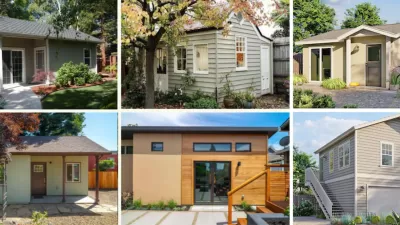A real estate group claims the city has been denying and delaying ADU permits in violation of city and state laws.

A real estate group is suing Coronado, a resort town in the San Diego Bay, for allegedly violating the city's own Accessory Dwelling Unit law by denying or delaying permits for new 'granny flats,' reports Phillip Molnar for the San Diego Union-Tribune.
The California Association of Realtors, who brought the suit through its associated non-profit Californians for Homeownership, claims that "it completed a nine-month investigation of applications for accessory dwelling units, often called granny flats, and found Coronado had a policy on the books to approve applications — but had been denying them anyway." A spokesperson for the city denied the allegations, asserting that no permits were denied to applications that complied with city and state regulations. She accused the California Association of Realtors of "exploit[ing] perceived loopholes created by state law that would allow them to create super-sized, single-family homes that sell for a premium."
Californians for Homeownership insists that Coronado created unnecessary roadblocks to granny flat construction, leading some builders to abandon the projects altogether in a community where more housing is desperately needed. "Coronado is one of the most expensive communities in the region and could benefit greatly from lower-cost rentals in the form of granny flats." The organization points to an email from Coronado Community Development Director Richard Grunow in which he states that "the applicant had to fully complete the construction of a new house before work on the granny flat could begin," a policy that violates state and city ADU laws and increases the cost of construction. Granny flat construction is growing in popularity as a policy that lets cities increase density and build more housing units without radically altering neighborhood character.
FULL STORY: Coronado sued over allegedly denying granny flats

Maui's Vacation Rental Debate Turns Ugly
Verbal attacks, misinformation campaigns and fistfights plague a high-stakes debate to convert thousands of vacation rentals into long-term housing.

Planetizen Federal Action Tracker
A weekly monitor of how Trump’s orders and actions are impacting planners and planning in America.

In Urban Planning, AI Prompting Could be the New Design Thinking
Creativity has long been key to great urban design. What if we see AI as our new creative partner?

King County Supportive Housing Program Offers Hope for Unhoused Residents
The county is taking a ‘Housing First’ approach that prioritizes getting people into housing, then offering wraparound supportive services.

Researchers Use AI to Get Clearer Picture of US Housing
Analysts are using artificial intelligence to supercharge their research by allowing them to comb through data faster. Though these AI tools can be error prone, they save time and housing researchers are optimistic about the future.

Making Shared Micromobility More Inclusive
Cities and shared mobility system operators can do more to include people with disabilities in planning and operations, per a new report.
Urban Design for Planners 1: Software Tools
This six-course series explores essential urban design concepts using open source software and equips planners with the tools they need to participate fully in the urban design process.
Planning for Universal Design
Learn the tools for implementing Universal Design in planning regulations.
planning NEXT
Appalachian Highlands Housing Partners
Mpact (founded as Rail~Volution)
City of Camden Redevelopment Agency
City of Astoria
City of Portland
City of Laramie





























